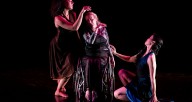With the pandemic cancelling what would have been Momenta’s third annual Inclusive Dance Festival—originally scheduled April 25 as an all-day event—the company’s integrated dance program, EveryBody Can Dance (EBCD), is going virtual.
April 5 was going to be the last of six EBCD regularly-scheduled integrated dance workshops, taking place throughout the year at the company’s home, The Academy for Movement and Music in Oak Park. Instead of cancelling the workshop due to statewide shelter-in-place orders, Momenta decided to try running the workshop online through Zoom.
In launching its first Zoom version of EBCD, Momenta’s online experiment drew 28 participants of all abilities and levels of experience from Chicago, across the Midwest, and as far away as Oregon, New York, and Georgia. See Chicago Dance spoke with four of Momenta’s EBCD facilitators in a recent group phone interview.
“We made sure we talked ahead of time about how we would do this online,” said Sarah Najera, Momenta’s artistic and executive director.
One of the questions Momenta faced in reconfiguring EBCD was how to make an online movement workshop as dynamic is the in-studio group experience. The facilitators wanted to offer a comprehensive warm-up and an interesting variety of contrasting prompts for movement exploration and composition, with engaging music to stimulate movement invention and creativity. “We did an online trial run on a test audience,” Najera said, “to find out what would work best.”
“One of the keys to making it fun was to build excitement,” said Ladonna Freidheim, a dancer, EBCD facilitator, and arts and culture consultant for Access Living. Access Living is a center for independent living which serves Chicagoans with disabilities. To that end, the group designed a 30-minute workshop.
The 30-minute workshop started with a warm-up, beginning with breathing to background music led by Julia Cox, dancer and EBCD facilitator, followed by company dancer Kris Lenzo’s shoulder and upper body warm-up. Deborah Goodman, choreographer, coach and former Momenta dancer, wrapped up with a whole-body warm-up. Then came the movement exploration, with three different prompts by the facilitators.
“Whoever was leading gave an example,” Goodman said, but participants were offered the option to “either follow the leader or go on their own; do what feels good on your body—(even) if it’s just your nose.” Everything was taught from a seated position.
For Goodman’s “Brain Dance,” she chose three pieces of music set to the prompt: “Flow.” Lenzo followed with “Twisting,” using the music, “Twist and Shout!” In a third segment, Goodman explored the concept of “Circles.” At the end of the movement workshop, facilitators allowed for an un-muted group visit among the participants.
The April 5 online event was so successful, Momenta has decided to expand the virtual EveryBody Can Dance into a continuing online opportunity for dancers of all abilities and experience on the first Sunday of the month, at least through the summer. The next segment will take place on Sunday, May 3.
“One thing we learned was that 30 minutes isn’t enough time. It needs to be longer,” Goodman said. The May 3 session will be extended, with new prompts. By June 7, they plan to have breakout rooms for dancers to interact creatively with each other and to ultimately show their compositions to one another.
The Inclusive Dance Festival, curated by Goodman, was to have been an advertisement of sorts for next fall’s Counter Balance, an integrated dance performance scheduled for Sept. 12 and 13. Counter Balance is the annual concert co-produced by Momenta and Access Living and held at the Center on Halsted.
“It’s a growing festival,” said Goodman. Prior Inclusive Dance Festivals have consisted of three movement workshops, a keynote speaker and discussion. This year would have introduced a hip-hop dance workshop, an autism movement therapy workshop, documentary film, art films, and video footage of several integrated dance companies, including Momenta.
Freidheim was to have been the keynote speaker this year. She had planned to talk about the need for developing a pedagogy for teaching integrated dance techniques and composition, citing the importance of learning from other integrated dance companies that come to Chicago from across the country to participate in Counter Balance.
“Without lessons,” Freidheim said, “how can we learn?” She lamented Access Living’s recent loss of the space they had been using at the Lou Conte Dance Studios, which announced its closing last month due to the COVID-19 health crisis.
“The seed (idea) for the festival was to develop the desire for training; to create a space for diverse bodies to train and to perform,” Goodman said. “We’re hoping to expand the Inclusive Dance Festival (in the future) to three days, plus a performance.”
“This is a big anniversary year for Counter Balance and Access Living,” Goodman said of the production’s upcoming tenth edition. “We are hoping to do Counter Balance as planned,” she said. “But who knows?”
In the meantime, adversity has inspired Momenta with a new and viable way to engage dancers of all abilities in ongoing creative learning and development online.



